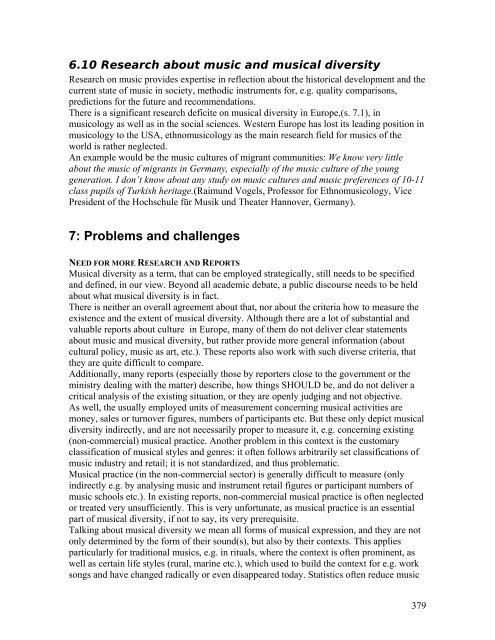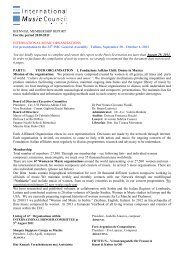Appendix 6 - International Music Council
Appendix 6 - International Music Council
Appendix 6 - International Music Council
Create successful ePaper yourself
Turn your PDF publications into a flip-book with our unique Google optimized e-Paper software.
6.10 Research about music and musical diversity<br />
Research on music provides expertise in reflection about the historical development and the<br />
current state of music in society, methodic instruments for, e.g. quality comparisons,<br />
predictions for the future and recommendations.<br />
There is a significant research deficite on musical diversity in Europe,(s. 7.1), in<br />
musicology as well as in the social sciences. Western Europe has lost its leading position in<br />
musicology to the USA, ethnomusicology as the main research field for musics of the<br />
world is rather neglected.<br />
An example would be the music cultures of migrant communities: We know very little<br />
about the music of migrants in Germany, especially of the music culture of the young<br />
generation. I don’t know about any study on music cultures and music preferences of 10-11<br />
class pupils of Turkish heritage.(Raimund Vogels, Professor for Ethnomusicology, Vice<br />
President of the Hochschule für Musik und Theater Hannover, Germany).<br />
7: Problems and challenges<br />
NEED FOR MORE RESEARCH AND REPORTS<br />
<strong>Music</strong>al diversity as a term, that can be employed strategically, still needs to be specified<br />
and defined, in our view. Beyond all academic debate, a public discourse needs to be held<br />
about what musical diversity is in fact.<br />
There is neither an overall agreement about that, nor about the criteria how to measure the<br />
existence and the extent of musical diversity. Although there are a lot of substantial and<br />
valuable reports about culture in Europe, many of them do not deliver clear statements<br />
about music and musical diversity, but rather provide more general information (about<br />
cultural policy, music as art, etc.). These reports also work with such diverse criteria, that<br />
they are quite difficult to compare.<br />
Additionally, many reports (especially those by reporters close to the government or the<br />
ministry dealing with the matter) describe, how things SHOULD be, and do not deliver a<br />
critical analysis of the existing situation, or they are openly judging and not objective.<br />
As well, the usually employed units of measurement concerning musical activities are<br />
money, sales or turnover figures, numbers of participants etc. But these only depict musical<br />
diversity indirectly, and are not necessarily proper to measure it, e.g. concerning existing<br />
(non-commercial) musical practice. Another problem in this context is the customary<br />
classification of musical styles and genres: it often follows arbitrarily set classifications of<br />
music industry and retail; it is not standardized, and thus problematic.<br />
<strong>Music</strong>al practice (in the non-commercial sector) is generally difficult to measure (only<br />
indirectly e.g. by analysing music and instrument retail figures or participant numbers of<br />
music schools etc.). In existing reports, non-commercial musical practice is often neglected<br />
or treated very unsufficiently. This is very unfortunate, as musical practice is an essential<br />
part of musical diversity, if not to say, its very prerequisite.<br />
Talking about musical diversity we mean all forms of musical expression, and they are not<br />
only determined by the form of their sound(s), but also by their contexts. This applies<br />
particularly for traditional musics, e.g. in rituals, where the context is often prominent, as<br />
well as certain life styles (rural, marine etc.), which used to build the context for e.g. work<br />
songs and have changed radically or even disappeared today. Statistics often reduce music<br />
379



